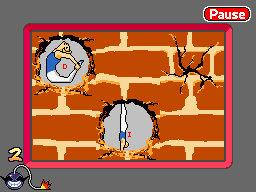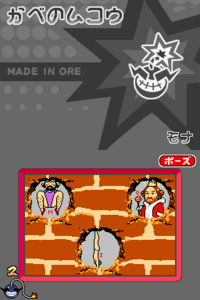Breakdown: Difference between revisions
mNo edit summary |
Tag: Undo |
||
| (26 intermediate revisions by 15 users not shown) | |||
| Line 1: | Line 1: | ||
[[ | {{minigame infobox | ||
[[ | |image = [[File:Breakdown WWDIY.png]] | ||
'''Breakdown''' is one of [[Mona]]'s [[microgame]]s in ''[[WarioWare: D.I.Y.]]'' | |appears_in = ''[[WarioWare: D.I.Y.]] | ||
|intro = ''Break!'' | |||
|type = [[Mona]] | |||
|info = ''"I wonder what's behind that wall?"'' | |||
|controls ={{button|ds|Stylus}} – Break wall | |||
}} | |||
[[File:Breakdown J WWDIY.png|thumb|left|Breakdown in the Japanese version]] | |||
'''Breakdown''' is one of [[Mona]]'s [[microgame]]s in ''[[WarioWare: D.I.Y.]]'' | |||
==Gameplay== | ==Gameplay== | ||
The only thing the player has to do is to break the three fissures in the wall | The only thing the player has to do is to break the three fissures in the wall by tapping them. When a fissure is tapped, a man representing one of the letters of the title of ''WarioWare: D.I.Y.'' appears. If time runs out, the player will lose. | ||
Since the title of ''WarioWare: D.I.Y.'' differs between localized and Japanese versions, the revealed people differ as well. In localizations, the three men form the letters D, I and Y by doing gymnastics. In the Japanese version, which is known as ''Made in Ore'', the people | Since the title of ''WarioWare: D.I.Y.'' differs between localized and Japanese versions, the revealed people differ as well. In localizations, the three men form the letters D, I and Y by doing gymnastics. In the Japanese version, which is known as ''Made in Ore'', the people represent the letters M, I and O and look different from each other. A sitting man forms the M with his bare legs, while an almost nude man does a handstand to resemble the I. The king appearing for the O does not form a letter but most likely appears because the Japanese word ''ō'' (王) means king. | ||
== | ==Names in other languages== | ||
{{foreign names | |||
|Jap=かべのムコウ | |||
{{WarioWare: D.I.Y. | |JapR=Kabe no mukō | ||
|JapM=The other side of the wall | |||
|Ita=Il muro | |||
|ItaM=The wall | |||
}} | |||
{{Mona's microgames}} | |||
{{WWDIY microgames}} | |||
[[Category:WarioWare: D.I.Y. microgames]] | |||
Revision as of 06:17, August 12, 2022
| Breakdown | |
|---|---|

| |
| Appears in | WarioWare: D.I.Y. |
| Type | Mona |
| Command(s) | Break! |
| Info | "I wonder what's behind that wall?" |
| Controls | |
Breakdown is one of Mona's microgames in WarioWare: D.I.Y.
Gameplay
The only thing the player has to do is to break the three fissures in the wall by tapping them. When a fissure is tapped, a man representing one of the letters of the title of WarioWare: D.I.Y. appears. If time runs out, the player will lose.
Since the title of WarioWare: D.I.Y. differs between localized and Japanese versions, the revealed people differ as well. In localizations, the three men form the letters D, I and Y by doing gymnastics. In the Japanese version, which is known as Made in Ore, the people represent the letters M, I and O and look different from each other. A sitting man forms the M with his bare legs, while an almost nude man does a handstand to resemble the I. The king appearing for the O does not form a letter but most likely appears because the Japanese word ō (王) means king.
Names in other languages
| Language | Name | Meaning | Notes |
|---|---|---|---|
| Japanese | かべのムコウ[?] Kabe no mukō |
The other side of the wall | |
| Italian | Il muro[?] | The wall |
